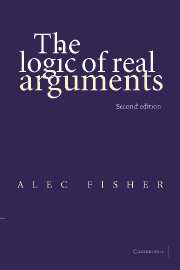Book contents
- Frontmatter
- Contents
- Preface to the first edition
- Preface to the second edition
- Acknowledgements
- 1 Introduction
- 2 A general method of argument analysis
- 3 A first example – from Thomas Malthus
- 4 Reasoning about nuclear deterrence
- 5 An example from John Stuart Mill
- 6 Arguments about God's existence
- 7 How do your mind and body interact?
- 8 Suppose for the sake of argument that …
- 9 An example from Karl Marx
- 10 Evaluating ‘scientific’ arguments. Some initial examples
- 11 Philosophical assumptions
- Appendix: Elementary formal logic
- Exercises
- Bibliography
- List of further reading
- Index
4 - Reasoning about nuclear deterrence
Published online by Cambridge University Press: 05 June 2012
- Frontmatter
- Contents
- Preface to the first edition
- Preface to the second edition
- Acknowledgements
- 1 Introduction
- 2 A general method of argument analysis
- 3 A first example – from Thomas Malthus
- 4 Reasoning about nuclear deterrence
- 5 An example from John Stuart Mill
- 6 Arguments about God's existence
- 7 How do your mind and body interact?
- 8 Suppose for the sake of argument that …
- 9 An example from Karl Marx
- 10 Evaluating ‘scientific’ arguments. Some initial examples
- 11 Philosophical assumptions
- Appendix: Elementary formal logic
- Exercises
- Bibliography
- List of further reading
- Index
Summary
The splitting of the atom has changed everything save our modes of thinking, and thus we drift towards unparalleled catastrophe.
Albert EinsteinThe arguments we consider in this chapter are about nuclear deterrence. This is a subject in which reasoning plays an enormously important part. Deciding which is the best policy is not simply a matter of discovering the facts about the weapons systems available to the two sides because it is hard to tell what these facts imply about intentions under deterrence, nor is it simply a matter of resolving to defend oneself since the difference between defensive and aggressive acts is obscure under deterrence. The importance of the arguments cannot be disputed, so how should we resolve them?
This chapter attempts to contribute to the debate not directly, but by explaining a method of analysing arguments using two specimen texts from the very extensive literature on the subject. The texts we have chosen are quite typical: there are certainly many other pieces expressing similar arguments and no doubt many of these would have served our purpose equally well; however, our focus of interest is not on these particular texts (typical or not) but in the method of assessing them. We succeed in our objective if the reader grasps the method of analysis explained by reference to these examples and is then able to apply it to other pieces of reasoning.
- Type
- Chapter
- Information
- The Logic of Real Arguments , pp. 48 - 69Publisher: Cambridge University PressPrint publication year: 2004



